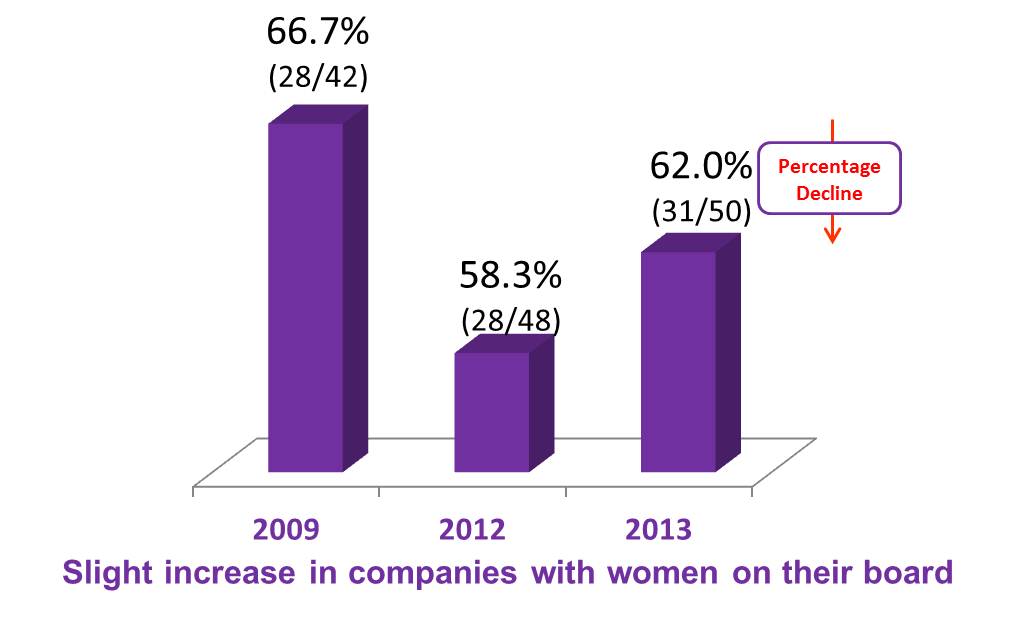
Despite emerging initiatives such as The Women’s Directorship Programme, the latest research from Community Business reveals what can be described as diabolically disappointing results. According to the Standard Chartered Bank Women on boards: Hang Seng Index 2013 Report there has been little progress, stagnation and even in decline in the representation of women on boards dependent upon which of the various analyses is used.
HR has more than a small part to play in attracting, developing and retaining the best in female talent, changing the company mindset towards an appreciation of the benefits of diversity and thereby striving for visibility of the issue at large. Assistance is thankfully at hand—effective from 1 September 2013 all companies listed on the Hong Kong Stock Exchange are required, on a ‘comply or explain’ basis, to have a policy on board diversity, disclose the policy and any measurable objectives for implementing it and to report on progress on achieving those objectives. Whilst there is no specific requirement to report on gender diversity, tracking representation of women on boards provides companies with a tangible measure to review composition of their board and assess to what extent they are incorporating a diversity of perspectives. Non-listed companies might consider following suit.
Katherine Tsang, Chairperson for Greater China, Standard Chartered Bank alluded to the diversity of flora and fauna in the natural world as key to sustainability of the natural habitat and likened it to the need for a wide array of mutually dependent businesses to make a vibrant and successful commercial world. By the same token a diverse set of pertinent experience should represent each one effectively. Certainly, there is strong indication that women on boards will encourage more open debates and a ‘group-think’ phenomenon which is less likely to leave stones unturned. Moreover, it is thought that as well as Boards emitting a richer perspective once they comprise a percentage of female membership, they will run more effectively and create better staff and customer service since this stakeholder base is diverse in composition.
The 2013 study reveals a bleak contrast to the proposed ideal; out of a total of 649 directorships on the Hang Seng Index only 61 are held by women. This represents just 9.4% and with an overall increase of just four new female directorships, only a nominal improvement since last year when the figure was 9%. Also of the total of 50 companies listed on the HSI there is a slight increase in the number of companies with women on their boards—from 28 companies in 2012 to 31 in 2013. However, 19 companies continue to have all male boards which is higher than 2009 when this figure stood at 14.
Both the number of female executive directors and the number of companies with female executives have remained static since 2012. In fact there has been an overall decline in the percentage of companies with female executives since 2009—24% down from 31%. Still only 15 women hold executive director positions and still only 12 companies have female executive directors. HR should note that Hong Kong’s leading companies are failing to create workplace environments that enable women to rise through the organisation and take on board roles. Of a total of 77 new appointments made in 2012 just nine directorships were made to seven different women.
The percentage of companies with more than one woman on their board has actually been steadily declining; now at 28% when in 2009 this number was almost 36%. This data point is so significant because international research suggests that it is only once a critical mass of women in the boardroom is reached – with three or more believed to be the tipping point – that real culture change can occur and boards can reap the benefits of gender diversity.
The report also includes a ‘Women on Boards League Table’ which ranks the companies listed on the HSI in terms of the gender diversity of their boards. At the top of the list is China Construction Bank Corporation—reclaiming its 2009 position—with four women on its board of 12—the highest proportionate total at a third. Hang Seng Bank Ltd ranks second place, with five women on its board of 16.
Fern Ngai, CEO of Community Business pointed out that gender is of course just one aspect of the broader diversity context. But she cautioned, “The poor results of our latest study show that more needs to be done in Hong Kong. If we assume that the total number of directors remains the same at 649, at the current rate of just four additional female directorships each year, it will take approximately 49 years to secure 30% representation of women on boards and 81 years to reach parity.”







